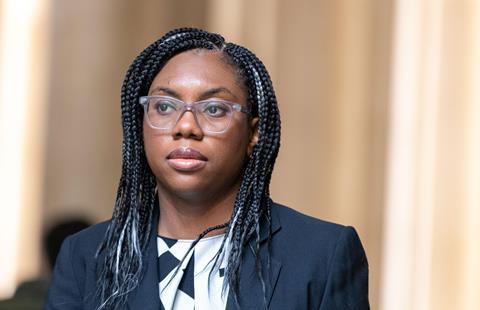Kemi Badenoch joined six other initial contenders for leadership of the Conservative Party. Sharmila Meadows takes a look at the politician’s background and believes Badenoch would, ’challenge and expose the government robustly and with tenacity and courage.’

There was a moment last summer when actor David Tennant, speaking at the British LGBT awards, said he hoped for a day when then Minister for Women and Equalities, Kemi Badenoch “doesn’t exist anymore” and would “shut up”. It was a worrying sign of the times and of a cultural landscape that has militantly imposed its beliefs and hijacked free speech. A landscape that Badenoch has had the courage to address.
A few months and a general election later, Kemi Badenoch now sits on the Opposition benches and is launching her bid for leadership of the Conservative Party.
A few months and a general election later, Kemi Badenoch now sits on the opposition benches and is launching her bid for leadership of the Conservative Party. She does so entirely to the backdrop of these culture wars. Called Renewal2030 - potentially a response to Starmer’s speech on fixing the nation’s foundations - Badenoch’s campaign focuses on being bold. She says the last administration “talked right, but governed left”. She wants to restore the party’s foundations and deal in hard truths.
She has said: “When you have that type of cultural establishment trying to keep conservatives down…you need someone like me who’s not afraid…who’s going to take the fight to them.” This is precisely what makes Badenoch so relevant.
Born in Wimbledon in 1980 to Nigerian parents, Kemi Badenoch acquired a Master of Engineering in 2003 and Bachelor of Laws (LLB) in 2009. The following year, she joined the Conservative Party. Her political service began at the London Assembly from 2015-2017, before entering parliament at the 2017 General Election, carrying the safe seat of North West Essex (formerly Saffron Walden).
Badenoch quickly rose to ministerial office under Boris Johnson before promotion to cabinet by Liz Truss. Rishi Sunak retained her at the cabinet table as Secretary of State for International Trade and Minister for Women and Equalities and it is this latter portfolio that has placed her in the headlights of today’s culture wars.
For Badenoch is unafraid to blow against the wind - and nor should we be because Jesus was profoundly countercultural.
For Badenoch is unafraid to blow against the wind - and nor should we be because Jesus was profoundly countercultural. Badenoch however is not a believer, describing herself as a “cultural Christian”; someone without a personal faith, but whose world view is broadly biblical. It may explain why she supports same-sex marriage, although as Equalities’ Minister, she also applauded Christian MSP Kate Forbes’ right to oppose it.
On other touchstone policies, Badenoch’s stance is more biblical. The Bible is clear about God’s intended creative distinction between men and women and how we are made in his image (Genesis 1:27 and Deuteronomy 22:5). A key proponent of Sunak’s bid to remove gender confusion and protect women and girls, she prepared legislation to amend the Equality Act 2010 so that it applied to biological sex. Under its proposals, single-sex spaces, such as public toilets and hospital wards, would no longer have to serve biological males who identify as female.
Scripture is also clear that Israel is God’s chosen people and that he will bless those who bless her and curse those who don’t (Genesis 12:3). Badenoch co-sponsored the Anti-BDS Bill in parliament, clipping the wings of the anti-Israel boycott movements, and as Trade Secretary, forged a free trade agreement with Israel despite hostility. She has compared Hamas to Boko Haram and expressed her concerns about the five MPs elected on a pro-Gaza ticket and the intimidatory politics underpinning their success.
Read more on female politicians
This is the voice of a woman who supporters call “brave” and having “backbone”. It’s what good democracy requires.
What the Conservative Party needs is a leader who can challenge and expose the government robustly and with tenacity and courage. Badenoch fits that bill. They also need a leader who can win elections. If we’re dealing in hard truths, would enough voters be persuaded that Badenoch, of Nigerian heritage and who spent her childhood in Nigeria and America, is best placed to understand and lead the country? Enough that is to overturn a disastrous election result? My gut feels that Robert Jenrick, another leadership frontrunner equally focused on “hard truths”, would better convince an electorate and carry the confidence of an often fractious party. Both would take the fight to Starmer.
These are nuanced and pragmatic choices to make. Whatever the Conservatives decide, one feels that Badenoch is a necessary and valuable voice at the top table.




































2 Readers' comments